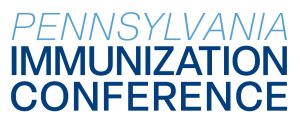Thursday, June 18, 2026
Hershey Lodge
325 University Dr.
Hershey, PA 17033
Internet Live Course
This training will be offered as a live online course, with details provided to registered participants in advance of the event. If you do not receive communications, check your eeds account or junk mail.
View mapRegistration information will be available soon.
Select this button to navigate the sections of this page
Conference ID
J7062
Save the Date
Sponsor

This activity is jointly provided by the Pennsylvania Department of Health and Penn State College of Medicine.
Purpose/Overview
Each year, the Pennsylvania Department of Health, Division of Immunization and Penn State College of Medicine presents a conference to bring immunization partners together to share information, discuss current issues and recommend strategies to improve immunization rates in Pennsylvania.
Audience
The Pennsylvania Immunization Conference targets private and public health care professionals from Pennsylvania and the surrounding region. This would include the following:
- Epidemiologists
- Family Physicians
- Health Care Professionals Working with Immunizations
- Health Educators
- Immunization Coalitions Members
- Medical Assistants
- Medical Students
- Nurse Practitioners
- Nurses
- Nursing Students
- Pediatricians
- Pharmacists
- Physicians Assistants
- Practice Managers
- Public Health Staff
- Residents
- School Nurses
Call for Podium Presentation Abstracts
Abstract submission for 2026 is closed.
Evaluation
A completed evaluation is required in order to receive a certificate for attending this activity. Please complete and submit the evaluation within the specified time frame.
Cancellations
The University reserves the right to cancel or postpone any course or activity because of insufficient enrollment or other unforeseen circumstances. If a program is canceled or postponed, the University will refund any program registration fees paid but cannot be held responsible for any related costs, charges or expenses, including cancellation/change charges assessed by airlines or travel agencies.
Program registrants who are experiencing illness or have been exposed to anyone who is ill should contact the Continuing Education office before attending any in-person activities.
Changes
Content and speakers for all programs are subject to change. Registrants will be notified of any significant updates.
COVID-19
On-campus educational activities provided by Penn State College of Medicine Continuing Education are required to follow healthcare facility guidelines. Off-campus events provided by Penn State College of Medicine Continuing Education follow the COVID-19 requirements of that venue. We ask that all participants respect that some attendees may still choose to wear masks for activities. Check the venue website for the latest requirements and recommendations. Please do not attend this activity if you have symptoms or have been exposed to someone with COVID-19. By attending the activity, you attest that you do not have any symptoms suggestive of COVID-19, which may include fever, cough, shortness of breath, sore throat, loss of taste, loss of smell or any other sign of illness.
Access (ADA)
Penn State encourages people with disabilities to participate in its programs and activities. Participants who anticipate needing any type of special accommodation or who have questions about the physical access provided should contact the Continuing Education office at least one week in advance of participation or visit.
Disclosure and Conflict of Interest (COI and Educational Balance)
It is Penn State policy to ensure balance, independence, objectivity and scientific rigor in all educational activities. Penn State has a process in place to mitigate any relevant financial relationships with commercial companies disclosed by faculty, course directors and planning committee members. Complete disclosure information will be provided to participants at the beginning of the activity.
University Nondiscrimination Policy
This publication is available in alternative media on request. The Pennsylvania State University is committed to the policy that all persons shall have equal access to programs, facilities, admission and employment without regard to personal characteristics not related to ability, performance or qualifications as determined by University policy or by state or federal authorities. It is the policy of the University to maintain an academic and work environment free of discrimination, including harassment. The Pennsylvania State University prohibits discrimination and harassment against any person because of age, ancestry, color, disability or handicap, genetic information, national origin, race, religious creed, sex, sexual orientation, gender identity or veteran status and retaliation due to the reporting of discrimination or harassment. Discrimination, harassment or retaliation against faculty, staff or students will not be tolerated at The Pennsylvania State University. Direct all inquiries regarding the Nondiscrimination Policy to the Affirmative Action Director, The Pennsylvania State University, 328 Boucke Building, University Park, PA 16802-5901; 814-863-0471 (TTY). US M.Ed. J7062
